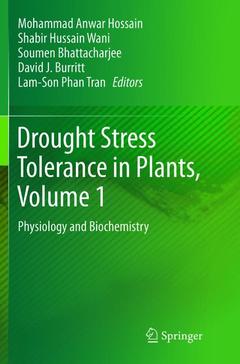Description
Drought Stress Tolerance in Plants, Vol 1, Softcover reprint of the original 1st ed. 2016
Physiology and Biochemistry
Coordinators: Hossain Mohammad Anwar, Wani Shabir Hussain, Bhattacharjee Soumen, Burritt David J, Tran Lam-Son Phan
Language: English
Subjects for Drought Stress Tolerance in Plants, Vol 1:
Publication date: 05-2018
Support: Print on demand
Publication date: 06-2016
526 p. · 15.5x23.5 cm · Hardback
Description
/li>Contents
/li>Biography
/li>Comment
/li>
Drought Stress in Plants: Causes, Consequence and Tolerance.- Drought Stress Memory and Drought Stress Tolerance in Plants: Biochemical and Molecular Basis.- Mechanisms of Hormone Regulation for Drought Tolerance in Plants.- Chemical Priming-Induced Drought Stress Tolerance in Plants.- Osmotic Adjustment and Plant Adaptation to Drought Stress.- Interplay Between Glutathione, Salicylic Acid and Ethylene to Combat Environmental Stress.-Function of Heat Shock Proteins in Drought Tolerance Regulation of Plants.- Ascorbate – Glutathione Cycle – Controlling the Redox Environment for Drought Tolerance.-Sulfur Metabolism and Drought Stress Tolerance in Plants.-Effects of Elevated Carbon Dioxide and Drought Stress on Agricultural Crops.- Drought Stress Tolerance in Relation to Polyamine Metabolism in Plants.- Plant-Rhizobacteria Interaction and Drought Stress Tolerance in Plants.- Signaling Role of ROS in Modulating Drought Stress Tolerance.- Improving Crop Yield Under Drought Stress Through Physiological Breeding.- Photosynthesis, Antioxidant Protection and Drought Tolerance in Plants.- Glyoxalase Pathway and Drought Stress Tolerance in Plants.- Drought Tolerant Wild Species are the Important Sources of Genes and Molecular Mechanisms Studies: Implication for Developing Drought Tolerant Crops.- Manipulation of Programmed Cell Death Pathways Enhances Osmotic Stress Tolerance in Plants: Physiological and Molecular Insights.- Determination of compositional principles for herbaceous plantings in dry conditions.- Determination of compositional principles for herbaceous plantings in dry conditions.
Dr. Mohammad Anwar Hossain is a professor in the Department of Genetics and Plant Breeding, Bangladesh Agricultural University, Mymensingh-2202, Bangladesh. He received his B.Sc. in agriculture and M.S. in genetics and plant breeding from Bangladesh Agricultural University, Bangladesh. He also received an M.Sc. in agriculture from Kagawa University, Japan, in 2008 and a Ph.D. in abiotic stress physiology and molecular biology from Ehime University, Japan, in 2011. In November 2015 he moved to Tokyo University, Japan, as a postdoctoral scientist to work on isolating low phosphorus stress tolerant genes/QTLs from rice. He has published 25 research articles, 15 book chapters, and 5 review articles on important aspects of plant physiology and breeding, plant stress responses and tolerance mechanisms, and exogenous chemical priming-induced abiotic stress tolerance. Recently, he edited a book entitled Managing Salt Tolerance in Plants: Molecular and Genomic Perspectives published by CRC press, Taylor and Francis Group, USA. He has attended several international and national conferences for presenting his research findings. He is a professional member of the Bangladesh Society of Genetics and Plant Breeding, Bangladesh Association for Plant Tissue Culture and Biotechnology, and the Seed Science Society of Bangladesh.
Dr. Shabir Hussain Wani is an assistant professor in the Department of Genetics and Plant Breeding, Sher-e-Kashmir University of Agricultural Sciences and Technology of Kashmir, Srinagar, Jammu and Kashmir, India. He received his B.Sc. in agriculture from BhimRao Agricultural University Agra, India, and M.Sc. in genetics and plant breeding from Central Agricultural University, Manipur, India, and Ph.D. in plant breeding and genetics on “transgenic rice for abiotic stress tolerance” from the Punjab Agricultural University Ludhiana, India. After obtaining his Ph.D. he worked as research asso




